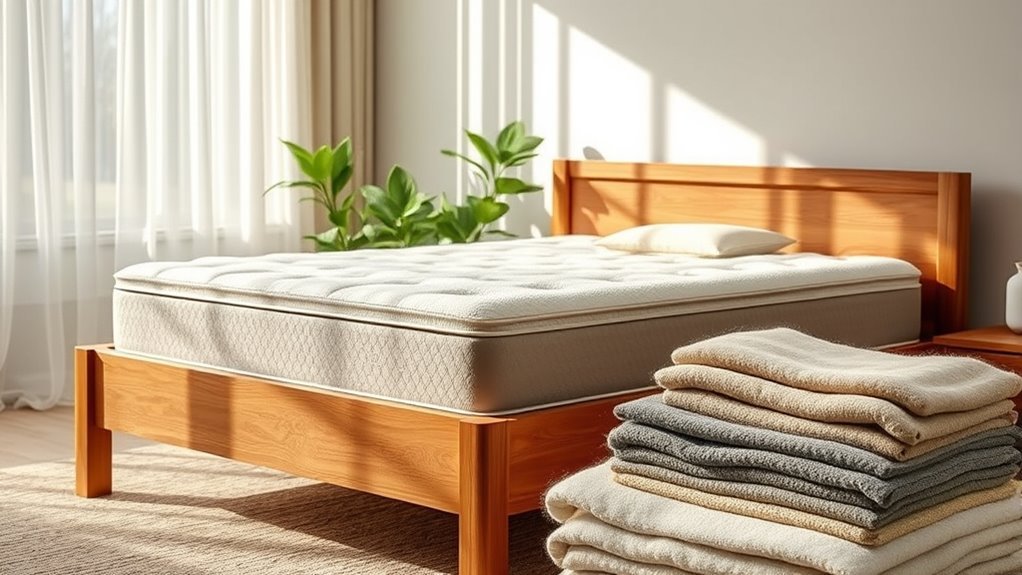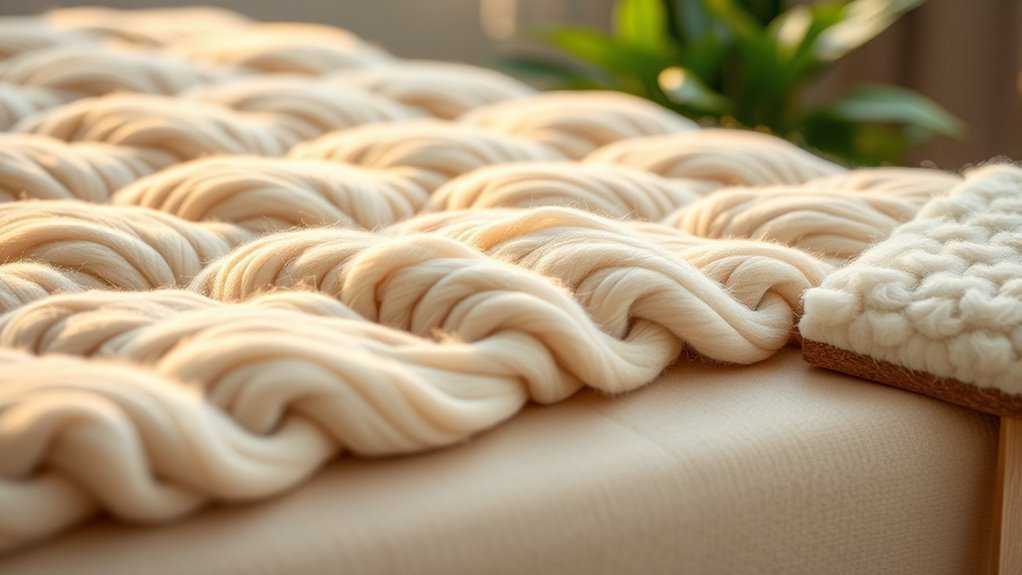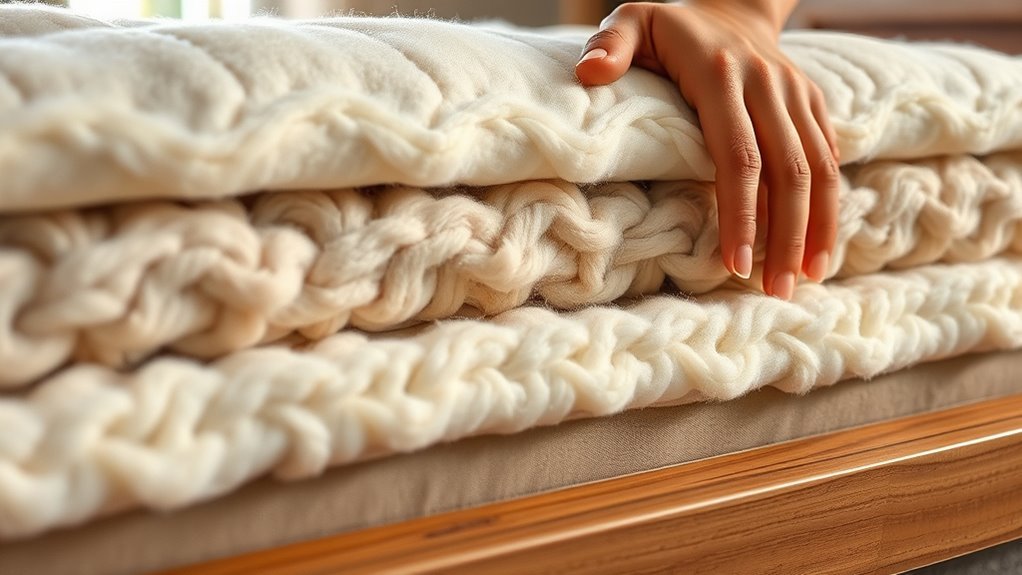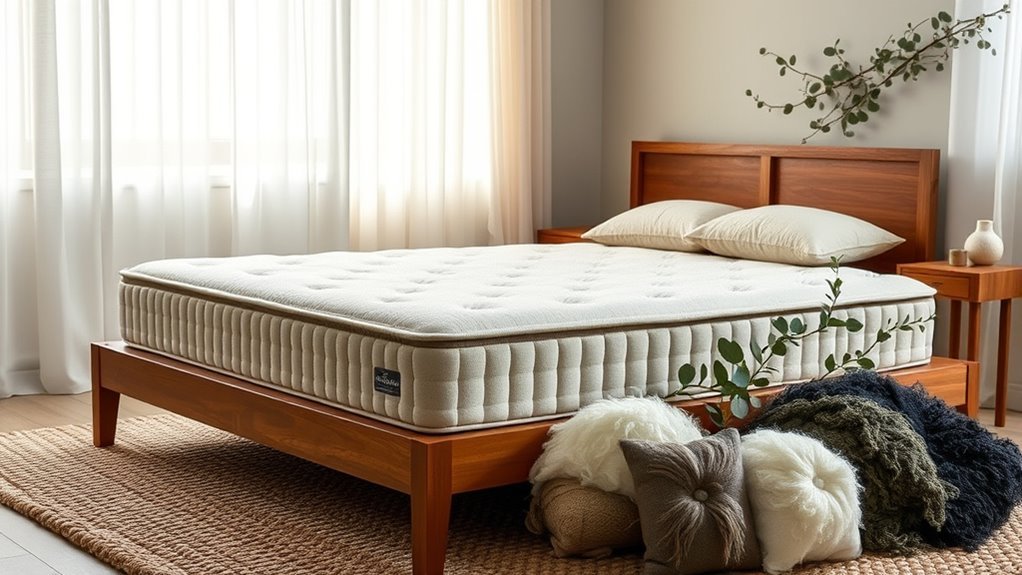Selecting a wool mattress for natural comfort involves evaluating key factors. Start by understanding the benefits of wool, such as its sustainability and hypoallergenic properties. Examine different types of wool for softness and support. Consider the mattress construction and guarantee breathability for temperature regulation. Check for eco-friendly certifications to confirm your choice is safe for the planet. Finally, set a budget that balances quality with affordability. Discover more insights to make the best choice for your sleep needs.
Understanding the Benefits of Wool Mattresses

When you consider investing in a mattress, you might be surprised by the numerous benefits that wool mattresses offer. Not only do they provide exceptional comfort, but they also come with significant sustainability advantages. Wool is a renewable resource, biodegradable, and produced with minimal environmental impact, allowing you to sleep soundly knowing you’re making a responsible choice.
Additionally, wool mattresses offer impressive health benefits. They’re naturally hypoallergenic, resisting dust mites and mold, which is essential for a restful night’s sleep. The moisture-wicking properties help regulate temperature, keeping you cool in summer and warm in winter. By choosing a wool mattress, you’re not just investing in your comfort; you’re embracing a lifestyle that prioritizes your health and the planet’s well-being.
Evaluating Different Types of Wool

When it comes to choosing a wool mattress, understanding the different types of wool and their processing methods is essential for your comfort and health. Each type offers unique qualities, from softness to durability, and how the wool is processed can affect its performance. By evaluating these factors, you can guarantee you’re making the best choice for a restful night’s sleep.
Types of Wool
Wool, known for its natural comfort and durability, comes in various types, each offering distinct benefits for your sleep experience. Understanding wool varieties can help you make a more informed choice when selecting a mattress. Here are four types to weigh:
- Merino Wool: Soft and breathable, perfect for temperature regulation.
- Shetland Wool: Known for its resilience, providing excellent support and durability.
- Lambswool: Luxuriously soft, ideal for those seeking a plush feel.
- Alpaca Wool: Hypoallergenic and moisture-wicking, great for sensitive sleepers.
When evaluating wool sourcing, it’s essential to choose high-quality varieties that align with your comfort needs. Each type brings unique features that can transform your sleep, offering you the freedom to enjoy restful nights.
Wool Processing Methods
Understanding the various wool processing methods can greatly impact your mattress choice and overall sleep quality. When selecting a wool mattress, pay attention to wool sourcing practices. Ethically sourced wool guarantees sustainable farming and animal welfare, giving you peace of mind. Next, consider natural dyeing techniques used in the fabric. These methods not only enhance the wool’s aesthetic but also maintain its hypoallergenic properties. By choosing mattresses that prioritize these practices, you support a healthier environment and a more responsible industry. Ultimately, your choice reflects your values and desire for a natural, comfortable sleep experience. So, embrace the freedom to choose wisely, assuring your mattress aligns with your commitment to sustainability and quality.
Considering Wool Mattress Construction

As you explore your options for a comfortable night’s sleep, it’s essential to reflect on how the construction of a wool mattress can greatly impact your rest. Understanding key elements will empower you to make an informed choice. Consider these factors:
- Wool Sourcing Options: Look for ethically sourced wool that guarantees quality and sustainability.
- Layer Composition: A combination of wool, cotton, and natural latex can enhance breathability and comfort.
- Durability Factors: High-quality wool mattresses resist wear and maintain their shape over time.
- Craftsmanship: Handmade mattresses often offer superior construction and attention to detail.
Assessing Firmness Levels for Comfort
When choosing a wool mattress, it’s essential to contemplate how firmness levels can significantly influence your sleep quality. Different firmness ratings cater to various comfort preferences, so understanding what works for you is vital. If you prefer a softer feel, a plush mattress can cradle your body, alleviating pressure points. On the other hand, if you need more support, a firmer mattress can help align your spine and promote better posture. It’s all about finding that perfect balance that allows you to experience restful sleep. Don’t hesitate to test out different options; your mattress is a personal sanctuary. Prioritize your comfort preferences, and you’ll gain the freedom to enjoy rejuvenating slumber every night.
Importance of Breathability and Temperature Regulation
When you choose a wool mattress, you’re investing in natural breathability that helps keep you comfortable through the night. Wool’s ability to regulate temperature and manage moisture means you can enjoy a restful sleep without waking up too hot or too cold. Understanding these benefits can truly enhance your overall sleep experience.
Wool’s Natural Breathability
While you might not immediately think of wool as a top choice for a mattress, its natural breathability plays a crucial role in your sleep comfort. Wool’s unique properties guarantee you enjoy a restful night without feeling trapped. Here’s why it’s worth considering:
- Natural Insulation: Wool keeps you warm in winter and cool in summer.
- Air Circulation: Its fibers allow for excellent airflow, helping to regulate moisture.
- Hypoallergenic: Wool naturally resists dust mites and allergens, promoting a healthier sleep environment.
- Durability: A wool mattress lasts longer, giving you the freedom to enjoy its benefits for years.
Temperature Control Benefits
Wool mattresses excel not only in their breathability but also in their ability to regulate temperature, ensuring you stay comfortable throughout the night. With natural wool insulation, these mattresses provide exceptional temperature stability, adapting to your body’s needs as you sleep. Whether you’re a hot sleeper or tend to feel chilly, wool’s unique properties work to balance your body temperature, keeping you cozy without overheating. This means you’ll wake up refreshed, not tangled in sweat or cold sheets. Choosing a wool mattress isn’t just about comfort; it’s about embracing a restful sleep experience. By opting for this natural solution, you’re allowing yourself the freedom to enjoy undisturbed nights, making every moment of sleep count.
Moisture Management Properties
As you seek a restful night’s sleep, understanding the moisture management properties of your mattress can make all the difference. Wool mattresses are fantastic for moisture absorption and breathability, promoting a comfortable sleep environment. Here’s why you should consider them:
- Natural Insulation: Wool insulation regulates temperature, keeping you cozy without overheating.
- Moisture Control: Wool can absorb up to 30% of its weight in moisture, wicking away sweat and preventing discomfort.
- Breathability: The fibers allow air to circulate, reducing humidity and ensuring a fresh sleeping surface.
- Health Benefits: A dry sleep environment can help prevent allergies and enhance overall well-being.
Choosing a wool mattress means investing in your comfort and health, giving you the freedom to enjoy restorative sleep every night.
Exploring Eco-Friendly Certifications
Have you ever wondered how to secure your mattress is truly eco-friendly? The eco label significance can’t be overstated when you’re seeking a wool mattress. Look for certifications from reputable certification bodies like Global Organic Textile Standard (GOTS) or OEKO-TEX. These labels guarantee the materials used are free from harmful chemicals and produced sustainably. By choosing certified products, you’re not just investing in a healthier sleep environment; you’re also supporting ethical practices that respect the planet. It’s empowering to make choices that align with your values, and eco-friendly certifications make it easier. So, take a moment to check those labels—your freedom to choose a sustainable lifestyle starts with informed decisions about your mattress.
Setting a Budget for Your Wool Mattress
After ensuring your mattress is eco-friendly with the right certifications, it’s time to contemplate how much you’re willing to spend on a wool mattress. Setting a budget isn’t just about the numbers; it’s about your comfort and the freedom to choose quality. Here are some budget considerations to keep in mind:
- Quality vs. Price: Higher-quality wool materials can last longer, saving you money in the long run.
- Brand Reputation: Research brands for price comparison; trusted names often justify a higher price.
- Warranty and Return Policy: A good warranty can provide peace of mind.
- Sales and Discounts: Keep an eye out for seasonal sales to get the best deal.
Frequently Asked Questions
How Often Should I Replace My Wool Mattress?
You should replace your wool mattress every 7 to 10 years, as studies show that mattresses can lose up to 30% of their support over time. Keep an eye out for replacement signs like sagging, lumps, or persistent allergies. Your body deserves the best support for restful sleep, and a worn mattress can affect your well-being. Embrace the freedom of a rejuvenated sleeping surface; it’s essential for your comfort and health.
Can Wool Mattresses Be Washed or Cleaned?
No, you can’t wash wool mattresses like regular ones. Instead, focus on proper mattress maintenance to keep it fresh. Use gentle cleaning methods, like spot cleaning with a damp cloth and mild detergent. Air it out regularly to prevent moisture buildup. If you’re facing stubborn stains or odors, consider professional cleaning. Taking these steps will help extend your mattress’s life, ensuring you enjoy that natural comfort for years to come.
Are Wool Mattresses Suitable for Allergy Sufferers?
Yes, wool mattresses can be great for allergy sufferers. With their natural moisture-wicking and breathable properties, they help reduce allergens like dust mites and mold. You’ll find that wool’s inherent resilience allows it to maintain its shape, providing you with comfort and support. Imagine sleeping soundly, free from the irritation of allergens. By choosing a wool mattress, you’re not just investing in sleep; you’re embracing allergy relief and a healthier lifestyle.
Do Wool Mattresses Come With a Warranty?
Yes, many wool mattresses come with a warranty, offering you peace of mind. When considering a purchase, check the warranty coverage carefully, as it can vary markedly between brands. A solid warranty not only protects your investment but also reflects the manufacturer’s confidence in their product. You deserve a mattress that supports your comfort and health, so make sure you choose one with a warranty that meets your needs for long-lasting quality.
How Do I Properly Care for a Wool Mattress?
Caring for your cozy wool mattress is essential for comfort and longevity. Start with simple mattress maintenance tips: rotate it every few months to prevent uneven wear. Regularly vacuum the surface to remove dust and allergens, and spot-clean stains with a damp cloth. Enjoy the wool benefits of temperature regulation and moisture-wicking, ensuring a fresh sleep environment. By nurturing your mattress, you’ll embrace the freedom of restful nights and rejuvenated mornings.



